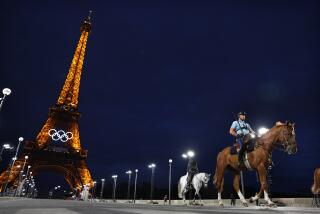Russia Prepares for Sunny, Safe V-E Day Celebrations, Summits
- Share via
MOSCOW — As leaders of more than 50 countries prepare to gather here for a three-day round of summits and celebrations marking the 60th anniversary of the end of World War II in Europe, authorities are trying to guarantee two things: sunny skies and no terrorism.
It’s unclear which is the bigger challenge.
As for any threatening rain clouds, they are due to be attacked by Russian air force planes at some distance from Moscow starting today. Chemical agents released by the planes are intended to trigger rainfall before the clouds reach Moscow, where President Bush will join Russian President Vladimir V. Putin and about 8,000 other guests Monday in Red Square to watch a military parade -- presumably in bright sunshine.
To guard against terrorist attacks, authorities are mobilizing 30,000 police and severely restricting vehicle traffic in the heart of Moscow. Exit from some downtown subway stations will be allowed only by special pass. Police have been conducting strict document checks in the capital for days.
Russian air force chief Vladimir Mikhailov acknowledged recently that the cloud-seeding effort would not guarantee fine weather. But he assured reporters that there was no chance any unauthorized aircraft could violate the “no-fly” zone over Moscow and stage an attack on visiting dignitaries. “Fighter crews will cut short the actions of any intruder aircraft,” he said.
The Victory Day parade, involving about 7,000 soldiers and 2,600 World War II veterans, will conclude with 12 planes flying in tight combat formation over Red Square, trailing plumes of white, blue and red smoke to simulate the Russian flag.
The greatest fear among authorities is an attack by separatists fighting for independence in Chechnya. Last year, the Russian republic’s pro-Moscow president was killed in a bomb blast during a Victory Day parade in Grozny, the Chechen capital.
“The danger of terrorism is very real,” said Stanislav Belkovsky, president of the National Strategy Council, a Moscow think tank. “The authorities have every reason to be afraid of Chechen terrorists.... I think foreign leaders’ security services are equally aware of the danger, and they will certainly take their own measures to protect their leaders.”
Scheduled events begin Sunday with a summit of the Commonwealth of Independent States, a group of a dozen former Soviet republics that has had trouble defining a reason for its existence. Azerbaijani President Ilham Aliyev planned to boycott the gathering, saying he did not want to sit down with Armenian President Robert Kocharyan. The two countries have a long-running territorial dispute.
Georgian President Mikheil Saakashvili will boycott the CIS summit and the parade, Georgian Foreign Minister Salome Zourabichvili said Friday in Moscow, because negotiators failed to agree on a timetable for the withdrawal of Russian military bases from Georgia. Saakashvili insisted on such an agreement as a condition for his attendance at the Moscow events.
Putin said this year that the CIS had served a valuable purpose by easing the trauma of the 1991 collapse of the Soviet Union and that it should not be seen as a vehicle to build great unity among member states.
“The European Union was set up for unification in Europe, but the CIS was set up for a civilized divorce,” he explained.
Nonetheless, CIS heads of state are expected to discuss collective efforts against terrorism, the boosting of cultural and educational ties and possible change in the group’s structure.
Bush and Putin have scheduled a Sunday night summit and dinner. Bush wants Putin’s help in dealing with international issues such as nuclear proliferation but also is committed to pressing for greater democracy in Russia. As part of his balancing act, Bush is tentatively scheduled to meet Monday with pro-democracy representatives of Russian civil society, in something of a throwback to the days when U.S. presidents met on the side with Soviet dissidents during visits to Moscow.
Putin is likely to press Bush for assurances that the American effort to promote democracy around the world will not extend to an attempt to destabilize his government, Belkovsky said.
British Prime Minister Tony Blair telephoned Putin on Friday to say that he could not attend Monday’s parade, the Kremlin press service said. Blair is busy forming a new government after his victory in Thursday’s general elections.
A summit Tuesday between Russia and the European Union could prove to be the most substantive event of the three days. The Russian Foreign Ministry said the two sides were expected to adopt plans to increase cooperation in four fields: economics and trade; freedom and justice; external security; and scientific research, education and culture.
As for the weather, cloud-seeding to bring clear skies to Moscow for important holidays dates to the times of Soviet dictator Josef Stalin, and many Russians believe in the method’s efficacy.
For the 50th anniversary celebrations, Moscow spent a reported $227,000 to disperse clouds. Some credited the effort with improving the weather. But when former Soviet leader Mikhail S. Gorbachev went to lay a wreath at the Tomb of the Unknown Soldier, he got caught in a downpour.
More to Read
Sign up for Essential California
The most important California stories and recommendations in your inbox every morning.
You may occasionally receive promotional content from the Los Angeles Times.










